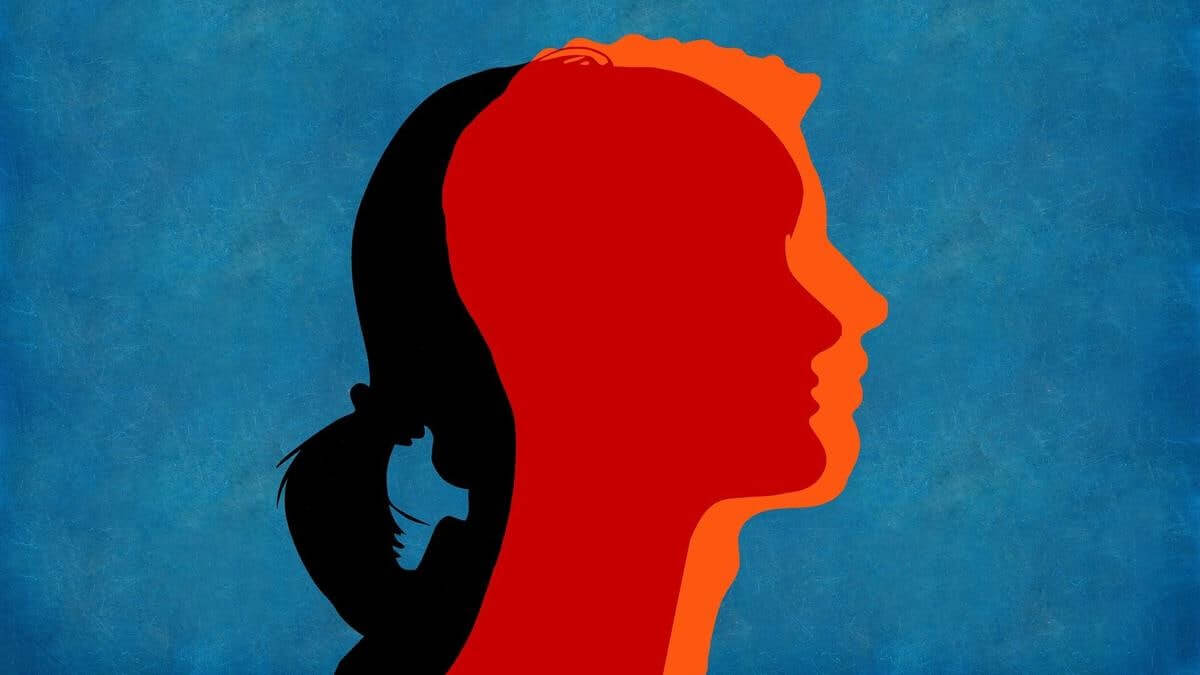People are afraid not of getting sick, but of being hospitalized
By Milana Levitskaya & Nasta Mantsevich (text); Mila Vedrova (pictures); Anton Klimovich (translation from Russian)
Fear of hospitalization, closed borders and not being able to bring medicine from abroad… Alisa, a member of the “TG House” initiative, trans*activist and the coordinator of targeted assistance from the Trans*Coalition in Belarus, tells about the difficulties that transgender people face during the pandemic, about her activist experience and the work of her team.
Since the appearance of MAKEOUT as an information platform for LGBT people, we have seen that different voices in the community have different volume. Invisibility can create a false impression of well-being, but this is fundamentally wrong: usually invisibility accompanies extreme vulnerability.
And the problems of the trans*community often remain invisible because of cis-privileges: even being an LGBT activist, a cisgender person does not face the economic or social consequences of systemic transphobia. That is why it is so important to listen to the voices of trans*activists.
As part of a large campaign of Trans*Coalition in the post-Soviet space aimed at helping trans*people during the pandemic, we have started cooperation with a new Belarusian initiative “TG House”. Alisa — a participant of this initiative, trans*activist and coordinator of targeted assistance from the Trans*Coalition in Belarus — agreed to share her activist experience and tell us about the work of her team.
Milana: Please tell us how you became a trans*activist. Did you have any expectations before you became the coordinator of the “TG House” initiative?
Alisa: The idea of “TG House” came to me quite spontaneously. A few years ago, I joined the organization “Our House”. At first, I did editorial work there, proofread texts, translated them, etc. And then I thought, “Why not?..” There are certain problems, and I would like to start doing something for trans people. So I talked to the main coordinator, and she supported me.
In October 2019, we monitored discrimination against transgender people in Belarus and identified the main points that we need to work with right now.
One of the main problems remains the inability to change the personal identification number in one’s passport. Many people now write that this is no longer a problem, because since 2012, the number has become depersonalized. Indeed, since 2012, the identification number in passports has not been linked to one’s legal gender at birth. But this is only true for new passports. All people over the age of 23 have passports issued before 2012, and they still have the same number. And it is incorrect to say that the problem is solved. In addition, there is still the problem of personal data protection: almost any employee can access the database of their organization and see the previous data of a trans person. This should not be the case, in fact, it is a violation of medical confidentiality and disclosure of personal information.
And of course, there is a global problem: a problem of social prejudices. Unfortunately, you can’t change society quickly, so the only chance to get any changes is to transform the legislation. We need to have laws providing liability for discrimination. In our country, if any offenses are committed against LGBT people, the authorities try to hush it up, they do not mention that the crime was committed on the basis of hatred, they present it just as disorderly conduct without any gender subtext.
Gender confirmation therapy in Belarus is now regulated by a decree of the Ministry of Health. In fact, it’s not even a law. We don’t have a single law that mentions the social group of LGBT people at all. They think if there are no LGBT people, then there are no problems. Therefore, it is important to elaborate all the main points at the legislative level: starting with gender affirmation therapy and ending with liability for hate crimes based on sexual orientation and gender identity.
Milana: What motivated you to get involved in activism in the first place?
Alisa: This decision was not easy for me. I did not aspire to be an activist at all — rather, activism entered my life itself. You can talk a lot about what you are not satisfied with in the current situation, but it is quite different to try to change something, to improve it, to do good.
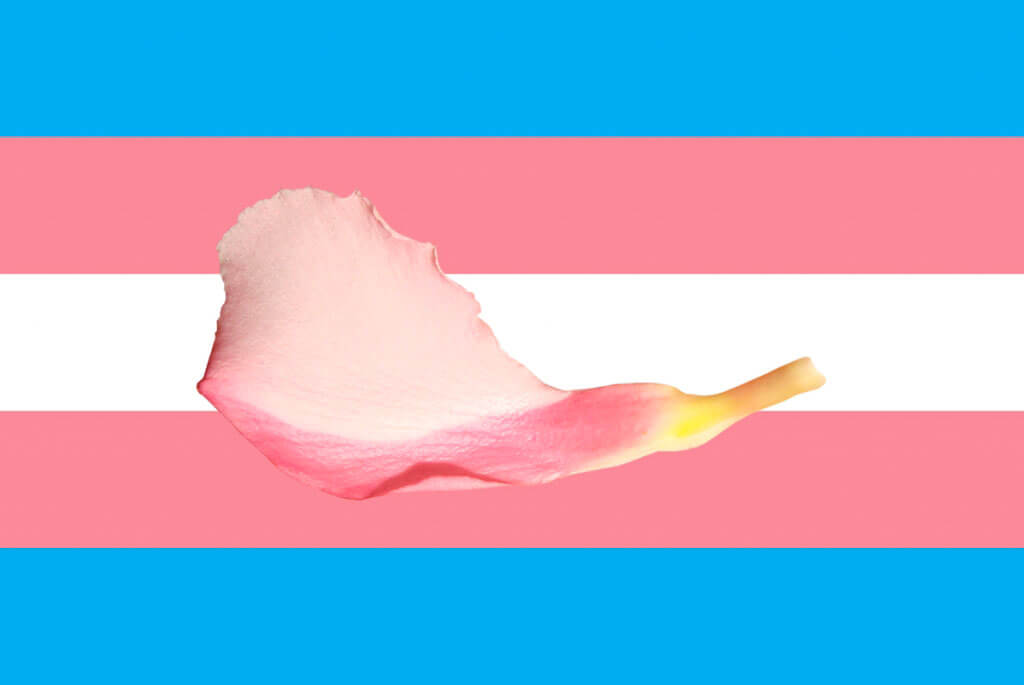
© Mila Vedrova
“Usually, when I talk about problems, I use my personal experience: how I live in general, what problems I had initially, when I decided to change my life and become myself. The first problem you face when you want to change is the family, the way you tell them everything”.
My parents’ reaction was terrible. For a long time, my mother thought that this was some kind of joke. Now it’s better, of course, we talk to each other, but in the beginning she didn’t want to accept anything at all. She treated me as if it couldn’t happen in her life.
It is important to think not only about the problems of trans people themselves, but also about their relatives, who also face certain problems. For example, what is the main fear of my parents? Personally, I see that their main fear is not that I do something to myself, but the opinions of other people. Colleagues, neighbors… For example, my aunt will call my mother and ask her: “How’s your son?” And mom doesn’t know what to reply. There is a fear of telling it to other relatives. They think about others first, and that’s difficult, of course. Our loved ones also suffer from transphobia. So they also need to be provided with psychological assistance to somehow prepare them, normalize their psychological state.
I don’t blame my parents for not accepting me. I understand perfectly well that they are an old-school Soviet generation and that it is difficult for them. They had a completely different upbringing, and they don’t understand “what’s going on” at all. But not everyone, of course, can just say: “Parents have not accepted me and that’s okay.” Many people need their parents to understand them. When you’re accepted and understood by people close to you, you immediately feel a desire to live, to do something, to develop, to go further. When rejection remains, it leaves a negative imprint. If even the closest people did not accept you, then what to say about others, about strangers? This is the “simplest” thing that one can get: the acceptance of one’s relatives. So I think a lot about what can be done, how to help parents and relatives.
When I first came to the organization “Our House”, initially I was afraid that there would be homophobes, transphobes… And I was surprised that people treated me normally, properly. Here I am judged not by my gender, but by my deeds. That’s how it should be. And I notice how this attitude affects the efficiency of work. Earlier, when I had other jobs, I constantly had a question in my head: “How will they perceive me?” My productivity decreased a lot because of it: these thoughts took a lot of time and effort. Most of the transgender people in Belarus have such a troubling question: “How will they perceive me?” And of course, it is difficult to have these thoughts all the time.
Milana: I think it’s very cool to come to an organization that initially had a different, broader agenda, and then offer your own. I think it’s a rare occasion, and it fills me with admiration. After all, even if you work in an NGO or some kind of civic initiative you are not immune to homophobia and transphobia anywhere. Because of it, I think a lot of LGBT people do not even come to those organizations (a wide range of those) which interest them, because there is a fear that they will say: “We support democracy, but it doesn’t mean we are not transphobes or homophobes.”
Alisa: I didn’t immediately make the decision to talk about my idea. We started working with “Our House”, and gradually I started to see that the atmosphere was generally suitable and that people treated me normally. I realized that they could support me, that maybe they had an understanding of my problem and accepted it. Only then I decided to offer my idea. At first, of course, I was scared. I thought: it’s good enough that they agreed to cooperate with me, I didn’t even consider offering them my own projects.
To move any initiative further, you need to show that the problem is not isolated. This is not a problem of just one person, or five people, or even ten…

© Collage by Mila Vedrova / The photo used for the collage is from Alisa’s archive
“You need to show that we are talking about hundreds of people who have social problems because of stereotypes, who constantly face negative reactions, who are not accepted, who are considered perverts, who have no support from their families.”
Because of these stereotypes, we cannot socialize properly. Finding a job is difficult. And there are a lot of other problems.
Even before the pandemic, unemployment was a big problem for many trans people in Belarus. Some stories of my acquaintances are just shocking. For example, one girl got a job helping a visually impaired woman. Somehow, that woman realized that the girl was trans and asked her not to come back. I was completely shocked. The person had good intentions: she came to help, to work as a nurse. And even the person who needed help herself refused to employ her.
And there are plenty of such examples. One of my friends held a senior position, everything was fine. Then she started taking hormones, the changes began, and she immediately got problems at her work. The person worked there for many years, everything was fine, she showed good performance… And suddenly she was fired for some formal reasons, they said that she began to work poorly. This is very strange.
I myself tried to get a job in Minsk in 2018. A very simple job. I met with the employer in their office, we talked, everything seemed to be OK. But while we talked I noticed something: the reaction to me was somewhat odd, there were some doubts, etc. It was a very simple job, actually a part-time one. I come home and think, well, it’s time to start working, I write to them… but no, they reply: “This job will not suit you.” They provided some excuses. I couldn’t even get my head around it, how could it be: it was such a simple job and it wouldn’t suit me. It was nonsense.
Such moments affect your self-esteem. It is not surprising that it is very easy to get depression later. It is, of course, very insulting when you’re denied employment even at some simple job where you have to do something manual, although you have an education and so on.
Milana: And I’m sure that most people don’t get a straightforward rejection. No one directly says “We won’t hire you due to homophobia or transphobia.” “We are transphobic, so…”
Alisa: No, of course not. They always come up with some other reason. And while it can be difficult to tell definitely when applying for a job whether they refused you because of your personal qualities, or for another reason… But when you work for years, and then you start to change, and you get fired — well, it becomes obvious. For so many years everything has been OK, and then for some reason there’s this sudden “coincidence”. How come?
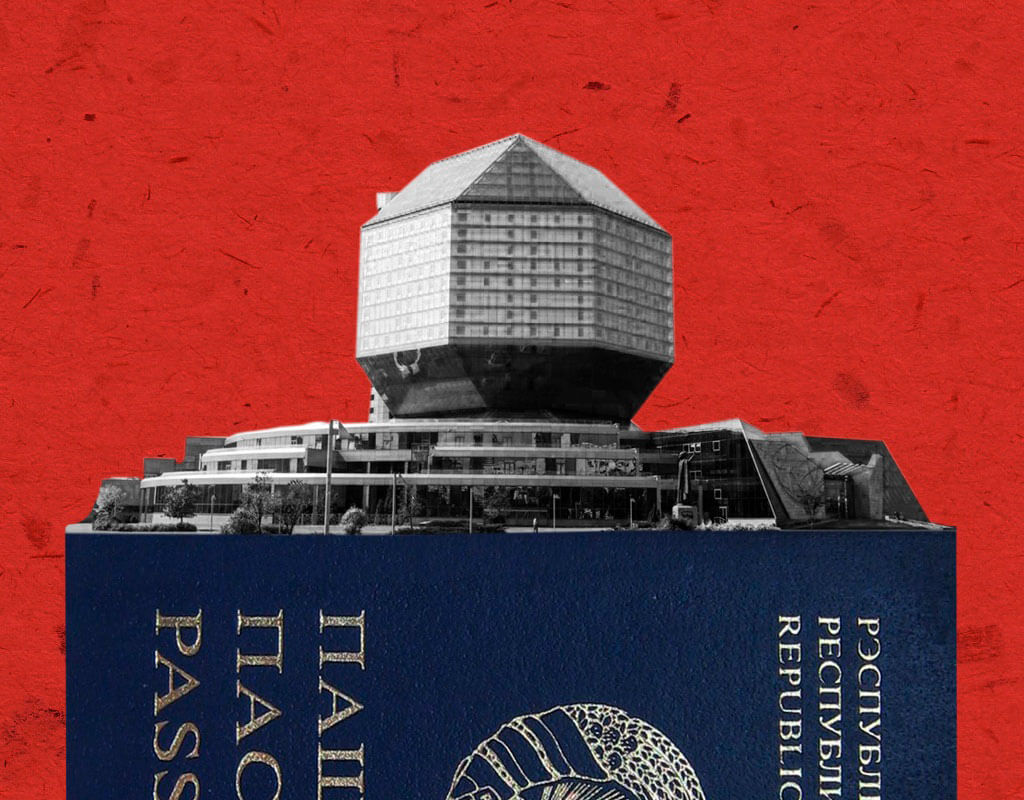
© Collage by Mila Vedrova
But I believe that even if you do not openly report such cases in the media, it is still important to try to get legal assistance. Otherwise, when you face injustice and don’t try to solve the problem, it becomes psychologically difficult to move on. And it will affect your further job search.
“This insecurity constantly affects a person. They are afraid of everything. They choose a job that may not be suitable for them at all, a job they do not like, simply because there is no other choice. Although they have qualification, education, experience, people have to choose a job based on one criterion: does this employer accept you or not. There are no other criteria.”
“Another problem that has always existed, but now, during the pandemic, has become even more pronounced, is the access of trans people to healthcare.”
Our study showed that people are more afraid not of getting ill, but of getting to a hospital, because they have such and such documents or such and such genitals that “do not correspond to their ID”, and this causes fear. I understand this perfectly well, because among our medical professionals there are also enough people who treat trans people badly.
My friends from the community mostly say that they rule out the possibility of getting sick. They will try to do everything not to get into the healthcare system: they will resort to self-medication, even if they feel bad, just not to go to a hospital, not to take tests, etc.
Of course, I think that if there is no way out at all, then people will ask for help. I am just like that. I also usually tolerate suffering to the very last moment. But when I realize that I have no other options — I have no fear left. I can go anywhere, I don’t care anymore. When it comes to health and there’s a risk of serious problems, it is necessary to seek help in any case.
But it’s a fact that the majority of trans people will put it off. And if you put it off, it can, of course, lead you to negative consequences. The fear of getting into this system is very big. Even those who have already done some surgeries and take hormones have it. All the same, there is a fear that “someone will suddenly notice and find out everything”. This fear is always there.
I think it is very important to work with such fears of the community. It is important to understand that no matter how much we work with society, no matter how much we inform everyone, there will always be transphobes and haters — in any place. Therefore, in addition to resisting discrimination, it is important to empower people so that they could support themselves, get rid of fears and develop self-confidence. I notice this in myself: for example, when I participate in conferences, I want to be seen confident. When I am shy or afraid, it is always visible, and I feel as if it devalues my words. And when I show confidence, initiative, the audience perceives my speech differently. It really works. I always try to prepare myself mentally: I tell myself not to think about the fact that I’m different in some way and remember that I’m an ordinary person. Not to think about how I will be perceived, how I will be looked at. When these thoughts are not there, when you have self-confidence, then the attitude of other people changes.
It is obvious that this does not always work everywhere, but it is better than fear and embarrassment, because they only make the situation worse. Of course, it’s easy to say: “Don’t be shy, don’t be afraid”. I also swing from one extreme to another: I can say that I’m not afraid of anything and everything is OK, and then at one point everything is the other way around. And the situations are different, and our emotional state can be different as well.
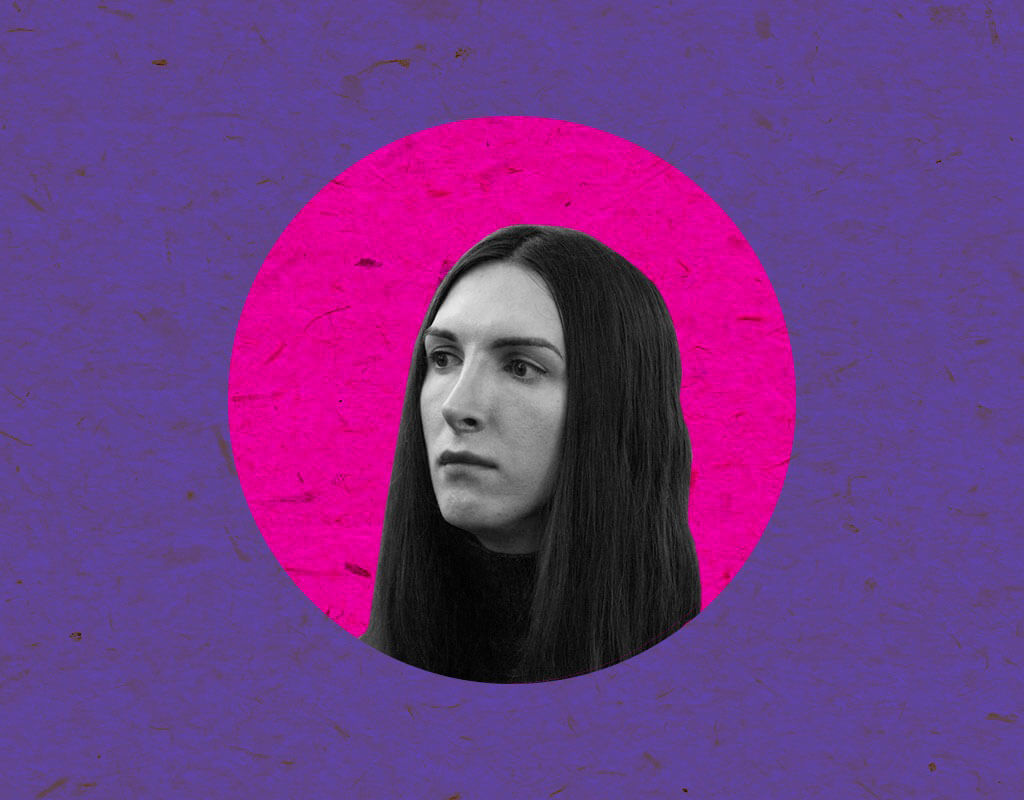
© Collage by Mila Vedrova / The photo used for the collage is from Alisa’s archive
Nasta: How has the pandemic impacted the lives of trans people? People have been facing unemployment and lack of access to healthcare for a long time, but closed borders and the inability to bring hormones from abroad are a new challenge. How does the trans community react to this, how do people feel about it, and how does it differ from the usual situation with prescriptions?
Alisa: Many people used to order hormones from abroad. And now people can not buy their medicine because of closed borders. Unfortunately, it is difficult to get a prescription for hormones in general. I believe that it is necessary to simplify the procedure of getting hormone therapy in Belarus, to give permission easier and faster. So that a person — if they already take hormones — can get the help of endocrinologists.
Now the rules of the Resolution № 163 say that hormones can be prescribed only after two years of medical observation, successful socialization (I wonder how this is possible when one’s appearance without HRT does not correspond to the desired at all?), obtaining permission to change ID and get surgeries, that is, after the second medical board meeting. We need to change this system: if a person comes to a gender therapist already taking hormones, if they have already started the official procedure and are in the process of gender-affirming therapy — they can’t be refused hormonal treatment, they should be able to continue their therapy after a check-up in a specialized medical center. To do this, it is necessary to hold a medical board meeting not once a year, as it is now, but once every six months, and to give permission not only to change one’s ID, but also to receive hormone therapy. After all, oftentimes a person simply can not look the way they want towithout hormones, the latter have a very big impact on appearance and therefore on socialization.
Interruptions in hormonal therapy affect health negatively. For example, a person, let’s say, has been taking some medicine for a year and now they can not buy it. They take tests, their endocrine profile has already changed and stabilized in a new way. Even a couple of months is a very long time, such radical shifts should not occur.
“The lack of prescriptions is exacerbating. Without prescriptions, a person has to take not the medicine that suits them most or the one they need, but the one that is available. Now there are these meds, and tomorrow there will be others; you’ll get what you can order. There is no consistency, sometimes you just have to accept whatever opportunities you have.”
It’s scary that people have to act at their own risk, order hormones and adjust the dosage themselves, because there are limited options. And now, when the borders are closed, even more so. Someone finds physicians they know and unofficially get prescription from them. If the government made it easier to get official prescriptions and people had access to HRT in six months, it would be much safer.
It is important to understand that people will take hormones one way or another, and nothing can be done about it. Now they try to intimidate us: “Do not take it, you are not allowed to.” But then how will a person socialize, how will they live? And this is not about abstract “beauty”: a person gets a permission to change their ID, then does it — and how are they supposed to live with these documents without HRT? Sometimes it’s just impossible.
Our endocrinologists often do not have enough knowledge. I know of cases when people with completely different body types and test results were offered the same scheme for feminization, the same medicine in the same dosage. I do not have a medical degree, but I already know much more from my experience than many specialists. There are a lot of guidelines on HRT in English on the Internet, but it is important to understand that all these protocols should be individual. They need to be adjusted for each individual, and the latter should be tested every few months to make further adjustments… There are many examples of medical professionals not getting it. For example, there is one popular medicine prescribed with the dosage of 50 mg. No specialist, not even my friend, believes that 6 mg a day can be enough to make everything OK. But for me it is enough to have a normal level of testosterone (for a woman), why should I take more? This is a simple example of the fact that the dosage should always be selected individually. So I do not write any universal tips and protocols anywhere.
Nasta: So even if one gets a permission to receive prescription medicine, there’s still not enough specialists who understand HRT. This is such a tangle of concerns that it forces people to deal with all these issues on their own, to find some consultants…
Alisa: That’s why it’s so important for us to have a community: this is an opportunity to share information. You still need to contact a doctor, a doctor is a doctor, they can correctly analyze and comment on your tests. But sharing your experience is very important. There is nothing criminal here, unlike giving out medicines without a prescription: when we talk about our experience, every one of us speaks for themselves, but our experience can be useful to others. I also did come up with the dosage of 6 mg by myself, one of my friends told me about it. At first I even thought it was a joke, I followed the average recommendation for everyone: about 50 mg. But I heard a real experience of another person. Then I tried to adjust my dosage, and it turned out that it suited me. I feel that lowered dosage is good for my health, so it seems strange to me that all people are immediately prescribed the maximum dosage, indiscriminately.
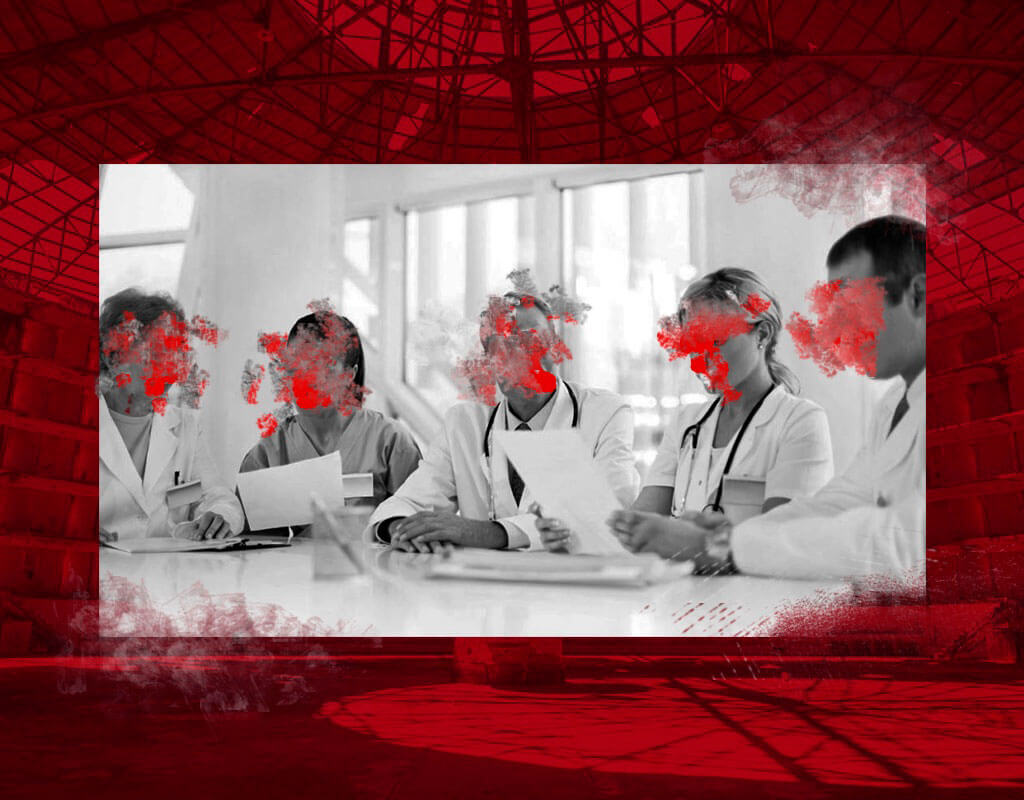
© Collage by Mila Vedrova
Milana: What other problems are there today with starting medical observation?
Alisa: One of the main fears is getting hospitalized for mandatory psychiatric examination. As soon as you come to register for medical observation, you are immediately given a referral to a psychiatric hospital. I have friends who have already passed all the tests, all the medical examinations, and they have only one referral left — to a psychiatric clinic. It is very difficult to bring oneself to getting into such a place. It is necessary to ensure that in the Resolution that exists now, mandatory hospitalization is replaced by outpatient examination. For example, while now a person goes to the sexologist once every three months, they can come more often, maybe once a month, but why get them out of their ordinary life so abruptly, placing them in a closed-type hospital?
“And nothing actually happens there. I remember my examination, it took three weeks. Guess how many days had some tests taken during them? Four. In a week and a half, I had already taken all the tests, and the rest of the week and a half I just had to wait for some associate professor to write a medical report.”
I asked them why I couldn’t go home then and later come to that associate professor to collect his report? “No”, they replied, “if you go home, you will go through everything from the beginning.” For a week and a half, absolutely nothing happened, I just sat there and waited. What is the point of such an examination, if all these procedures can be done on an outpatient basis? Let’s take a month, and during it a person will come to a clinic, take tests, get examined… It is such a traumatic event: to be told “Go spend some time in a lunatic asylum.”
Now, of course, the conditions of stay there have improved: for example, a person is placed in a separate ward for free, and before this was only possible for a fee. Now the rules of conduct are less harsh: when I was hospitalized, it was prohibited even to use a phone, it was taken away. But anyway, whatever the improvement was, the very fact of being there, this forced contact, uncomfortable questions… People have a right not to discuss their private life with others, they may not want to talk about themselves, but you are stuck with other patients for three weeks, you go together to the dining room, and they start asking you: why are you here, and what are you doing…
I had such an “interesting moment” during my stay there: I had many people around me, some received treatment, some were examined, and everyone asked me: why are you here? I thought, well, I’ll tell you. And then at the medical board meeting they began to reproach me because I “tell everyone about myself, and want to stand out”. [editor’s note: by being transgender]. What nonsense!
Or another interesting case: when I came to get a referral for hospitalization, I was asked: what do you do, what kind of education do you have, where do you work? I said that I graduated from the University of Warsaw and work for an international organization. And they looked at me in shock, as if saying: “What do you mean the University of Warsaw?!” They were shocked, they probably thought I made it up. The system doesn’t expect that people who go through this process can have a good job, a good education. If a person has a good education and a good job in an international organization, what problems can they have, doctors simply do not believe you. If a person is different in some way, they expect you to belong to some underclass, they immediately have such a stereotypical vision. And if a person really has nothing under their belt, they begin to reproach you. For example, if you do not have a job, they may not invite you to the medical board meeting at all, they say: “But how will you socialize without a job?” It’s complete rubbish! After all, a person in the process of medical observation may not work temporarily, because they are waiting to get the permission, change their ID and go to work. Actually, things such as work and education are such strange criteria…
Nasta: Recently, people interested in getting the permissions have written to us about their confusion. It is not yet clear what the pandemic will change for the trans community: how the system will work during the pandemic, whether the medical board will meet, how to visit specialists, where to apply…
Alisa: In general, everything works the way it used to. Doctors receive patients as always: both the sexologist (Podolyak), and the psychologist (Ignatovich) work. Yes, there are small disruptions in the schedule, but they keep working, one can contact them. Of course, in a situation like this, going to hospitals can be scary. But the fact remains: you can come, the pandemic has not yet affected the work of doctors. The next board meeting was supposed to be in early June: it is not yet known whether it will take place according to the schedule or be postponed to another date, but it will take place in any case. Now it’s a matter of specific dates, not its cancellation.
The fact is that in Belarus, the medical board includes a lot of people and it always complicates the choice of a date. There are 10-15 of them — and they all need to gather for one day. The question, of course, is why there are so many members in this board, why there are people without a relevant education… For example, representatives of the Ministry of Internal Affairs: we joke that they are sent to the board, apparently, as a punishment, because the person sits and does not understand what is happening around, just sits “for everyone to be present”. If the board consisted of 5-7 people with specialized education — psychiatrists, psychologists and sexologists — it would be easier to bring them together and easier to set a date. Optimizing the composition of the board is also one of the steps that the trans community needs to fight for.
Milana: Currently Trans*Coalition is providing targeted assistance in the post-Soviet region. If you are a trans person and need financial, medical, legal or psychological assistance, please leave your request here. Our teams have also joined this activity: by the time this text will be published, the first packages of food will have been delivered to people who appeared in a difficult situation due to the pandemic. Tell us about the progress of this work and current projects of TG House. What difficulties did you encounter when collecting requests?
Alisa: When people learn about the targeted assistance program, they often get embarrassed and refuse, they say: “My life is not so hard yet, help someone who has a worse situation, who needs help more.” I think that the very form of providing assistance — food — is the most difficult thing to accept. Getting groceries seems to mean that a person has already hit rock bottom… Even other forms of financial assistance, such as paying off debts for rent, phone bills, or just some one-time help with money, are not perceived with such resistance. A person thinks: if I ask for food, then I’ve become a human wreck, I should be ashamed. The situation is complicated. It is important to understand that even if this format is not ideal, but currently it’s the only way to provide assistance, and it is also necessary.
So far, we have received 22 requests, and, unfortunately, 11 of them have no contacts left at all — only the request for help, mainly about hormones. Take into account that in addition to public announcements about providing assistance, we also wrote to people through personal contacts. Some people left a request, and then canceled it… At the same time, their situation did not improve.
“This is very emblematic not only of the trans community, but also of Belarusian society on the whole: we put up with everything, we wait until the last moment and rely only on ourselves. We hesitate to ask for help. Sometimes people just don’t believe that someone can help them. There is another point: people are afraid to leave a request with their personal data. Someone will bring me help, that means someone will have my contacts — these concerns are easy to understand in a transphobic society.”
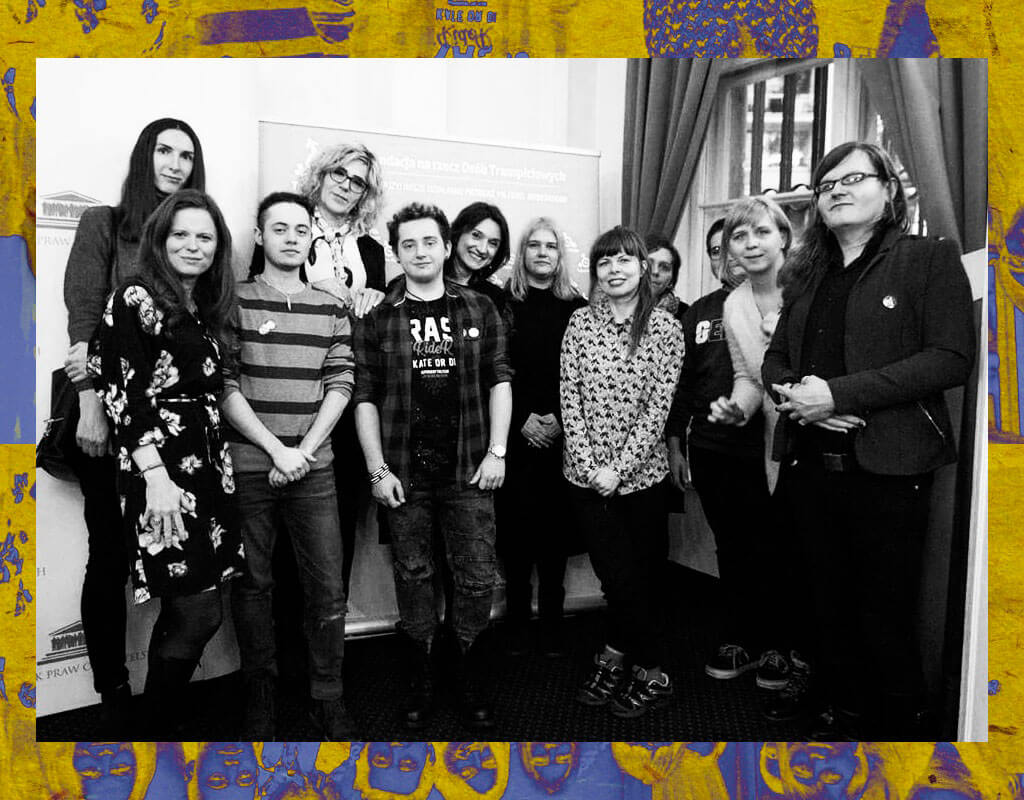
© Collage by Mila Vedrova / The photo used for the collage is from Alisa’s archive
That is why community is so important: when we share our experience, we can tell each other about safe, trustworthy contacts, about help, about work, about doctors. For example, when looking for a job, the community plays a crucial role: people can give advice to each other, share options… When you have a lot of people around you, you have a lot of opportunities to get help. This is especially valuable if a country — like ours — does not have legal protection against labor discrimination based on gender identity or sexual orientation.
“Employment is a serious problem for the trans community, but unfortunately, when there is a pandemic all over the world, few people care about discrimination…”
Our initiative group “TG House” still has been working on these issues. We can help people with legal technicalities and protection of their labour rights. For example, if a person was illegally fired and they suspect that it happened on the basis of transphobia. Perhaps the person will not want to go back to that workplace, but they have a right to compensation under the law. One can also contact us for legal support if a person is still studying and might experience discrimination in their university or college.
We also plan to work with awareness: we have several cases and people are ready to tell their story. Positive successful examples are very important for the trans community today — people should see that it is possible to defend their rights in case of labour discrimination.
But the most important and most real stage of our work today is lobbying for changes in the system of transition in Belarus. Addressing all these problematic points: meetings of the medical board, its structure, HRT prescription. We are preparing a list of changes and an appeal to the Ministry of Health. Here we use international experience and the experience of other organizations. After all, this Resolution has not changed since its adoption — there were some cosmetic changes, but it has never seen major changes, although the problems are obvious, they are easy to describe and, most importantly, it is easy to explain how and why it needs to be changed.
Soon, we also hope to arrange regular psychological assistance. Personally, I am always ready to share my experience of applying to specialists for medical and psychological help. I often see that people are afraid to start medical observation, afraid of the medical board, because they do not know what will happen there, what awaits them. I try to help in such matters, provide consultations, if a person has questions about the work of the medical board, about some specific things about each doctor, if it is important for them to talk personally with a person who has passed all this, I am ready to answer such questions.
If some trans people, after reading this article, want to join “TG House”, I will be very glad: any person can help, every person who wants to join us and can do it is important — with their experience, even their advice. We will also be happy to get support from NGOs and activists, especially in writing appeals and letters to the authorities. To achieve change, it is important to unite, to write collective appeals. As long as the trans community remains invisible, nothing will happen. In this sense, a very good example is the campaign for collecting signatures for a petition organized by “Identity and Law” . Natalia Mankovskaya and I met at the Human Rights School in Vilnius back in 2010, and today I see how much work she does to advocate and help the trans community.
Of course, the community needs more than just lobbying — it needs informal meetings for trans activists and just for trans people. There is no cost involved in just getting together. For example, we had an idea to organize a trans picnic, a field trip. Now, of course, it has been postponed, but we will definitely return to it when the epidemiological situation returns to normal. Informal communication is very important, because people are left alone with their problems.
Now “TG House” doesn’t have a lot of members, but each person “fights” in their own sphere. For example, one of the participants of the initiative — Vika — has long been fighting for an opportunity to change the identification numbers of trans people when changing their documents. Another activist — Vlad — is mostly concerned about the issue of mandatory stay in a psychiatric hospital, he applies all his efforts there. Everyone cares about something more than others, and it’s really cool to work with people who have one particular thing that concerns them. If you combine them all, each with their own personal problem, you can cover all areas.
I look at the experience of the organization “Our House”, which supports the initiative “TG House”, in particular, at the movement “Children 328” [translator’s note: named after the Article 328 of the Criminal Code of the Republic of Belarus addressing the Illicit traffic in narcotic drugs]. A few years ago, it seemed to everyone that it was impossible to achieve results in this campaign: how on earth can we help these children who were convicted on drug charges, how can we demand an amnesty? And today we see the results, and they are significant. International meetings, sending reports to the UN, mothers meeting with the European Commission representatives — everything works. Even taking into account the “good-looking” reports that our official structures send to the UN — our country does not want criticism from international institutions, the authorities are not interested in it, they listen. The campaign “Children 328” is a positive example, it brings inspiration. Without such examples, it would be sad to do something: when you put your efforts into work, and there is no output, you lose interest, the desire to struggle disappears. Mothers who are fighting — they have this personal pain, their own problem makes them demand the officials to act. I want trans people to believe in their power and participate in solving their problems. And for this, the community needs positive examples, activities that will be visible.
This article was originally published in Russian here. Translation into English was supported by Unit
Nothing beats good old email
For our monthly newsletter, we pick the most important news and analysis,
and add selected content and art from queer creators.

